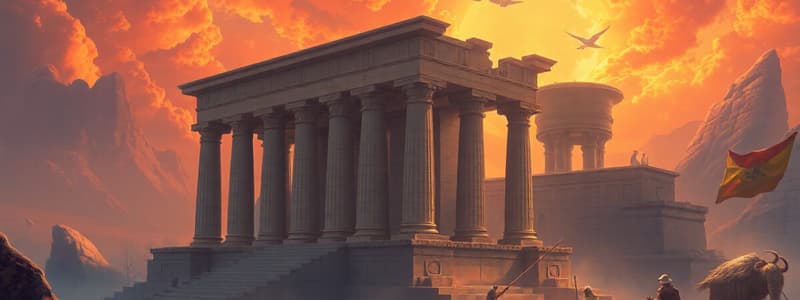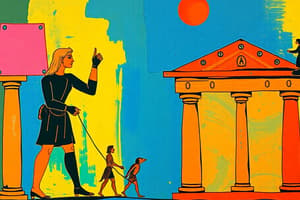Podcast
Questions and Answers
What enabled population growth in early civilizations?
What enabled population growth in early civilizations?
- Development of military strategies
- Invention of the wheel
- Fertile land for agriculture (correct)
- Proximity to large mountains
Which ancient civilization is known for developing a system of writing called hieroglyphics?
Which ancient civilization is known for developing a system of writing called hieroglyphics?
- Egyptians (correct)
- Mesopotamians
- Indus Valley
- Chinese
What major concept is attributed to ancient Greece?
What major concept is attributed to ancient Greece?
- Feudalism
- Democracy (correct)
- Monarchy
- Bureaucracy
The Crusades were primarily a series of conflicts characterized by what major theme?
The Crusades were primarily a series of conflicts characterized by what major theme?
Which event marked a major religious split in Europe during the Early Modern period?
Which event marked a major religious split in Europe during the Early Modern period?
What was a significant change brought about by the Industrial Revolution?
What was a significant change brought about by the Industrial Revolution?
The Cold War primarily involved a struggle between which two superpowers?
The Cold War primarily involved a struggle between which two superpowers?
What movement emphasized reason and individual rights during the Modern period?
What movement emphasized reason and individual rights during the Modern period?
Flashcards
Ancient River Civilizations
Ancient River Civilizations
Early societies developed around rivers for fertile land, agriculture, and population growth.
Greek Political Systems
Greek Political Systems
Ancient Greece created systems like democracy and citizenship.
Roman Empire Influence
Roman Empire Influence
The vast Roman Empire impacted Western law, infrastructure, and culture.
Rise of Feudalism
Rise of Feudalism
Signup and view all the flashcards
Renaissance Revival
Renaissance Revival
Signup and view all the flashcards
Scientific Revolution
Scientific Revolution
Signup and view all the flashcards
Enlightenment Influence
Enlightenment Influence
Signup and view all the flashcards
Industrial Revolution Impact
Industrial Revolution Impact
Signup and view all the flashcards
Study Notes
Ancient History
- Human history is a very long time period; its study involves archaeology, anthropology, and written records.
- Early civilizations developed around rivers (like the Nile, Tigris-Euphrates, Indus, and Yellow River). These locations offered fertile land for agriculture, enabling population growth.
- Key ancient societies include the Egyptians, Mesopotamians, Indus Valley, and Chinese civilizations, each developing unique forms of government, religion, and culture.
- The development of writing systems (hieroglyphics, cuneiform, etc.) allowed for the recording of knowledge, trade, and laws, and facilitated the accumulation of evidence for understanding the past.
Classical History
- Ancient Greece developed advanced philosophical and political systems, including democracy and the concept of citizenship.
- Greek influence is seen in Western art, philosophy, and literature.
- The Roman Empire was a significant power in the Mediterranean; they built an extensive network of roads, aqueducts, and cities.
- Roman law and legal concepts formed the basis of many Western legal systems.
Medieval History
- The Middle Ages are characterized by the decline of the Roman Empire, the rise of feudalism, and the gradual growth of the Church's power.
- Charlemagne's empire revived some aspects of Roman administration.
- The Crusades were a series of religious wars, showcasing the complexities of religious and political motivations.
- The Black Death had a significant impact on population levels and medieval society.
Early Modern History
- The Renaissance was a period of cultural and artistic revival that emphasized human potential and classical learning.
- The Reformation marked a major religious split in Europe, leading to religious wars.
- The Age of Exploration saw European powers expanding their influence across the globe.
- The Scientific Revolution challenged traditional views of the natural world.
Modern History
- The Enlightenment emphasized reason and individual rights, influencing political and social thought.
- The Industrial Revolution brought significant economic and social changes.
- The rise of nationalism led to the formation of new nation-states and conflicts.
- World Wars 1 and 2 had a profound impact on global politics and society.
20th and 21st-Century History
- The Cold War involved a geopolitical struggle between the US and the USSR.
- The rise of new technologies has transformed communication, transportation, and everyday life.
- Decolonization led to the emergence of numerous independent nations in Africa and Asia.
- Globalization has interconnected nations in economic, cultural, and political spheres.
- The impact of global crises (financial, environmental, pandemic) requires detailed study and ongoing research for understanding effects.
Studying That Suits You
Use AI to generate personalized quizzes and flashcards to suit your learning preferences.
Description
Explore the pivotal events and civilizations from ancient and classical history, covering the rise of early societies along major rivers, the development of writing systems, and the influences of Ancient Greece and Rome on modern culture. This quiz examines key aspects of government, religion, and philosophy that shaped human civilization.



